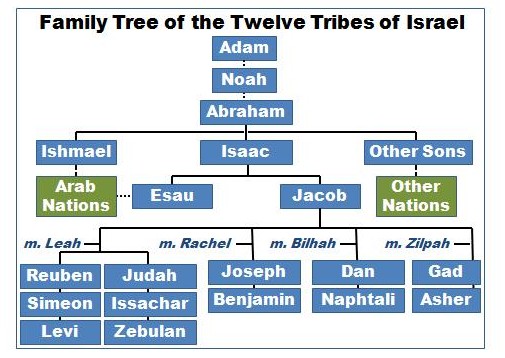

1 Chronicles 7-9
(Genealogy Concluded)
April 27th
Please refer to one or more Bible versions of your choice to read this section. We recommend that you read at least two versions for added understanding. For your convenience, we have provided six links below, each of which takes you directly to today's chapters in a specific version:
Bible Gateway
Key Verse
The following temple guards lived in Jerusalem: Shallum, Akkub, Talmon, and Ahiman. Shallum was their leader. Down to that time members of their clans had been stationed at the eastern entrance to the King's Gate. Formerly they had stood guard at the gates to the camps of the Levites. Summary of Chapters
These three chapters complete the genealogical review of the other tribes with a cursory record of their descendants and also records details on the families who returned from exile. The sections on Issachar and Benjamin in chapter 7 are relatively brief. The subsequent section on Naphtali is even shorter - just one sentence. Manasseh is mentioned again here, but perhaps refers to a different group of clans than the ones defined in the earlier chapter. The brief records of Ephraim and Asher round out the complete set of tribes.
The first Israelites to return from exile to their homes and cities were the priests, the Levites, and the temple support staff.
The Levites were followed by members from the tribes of Judah, Benjamin, Ephraim, and Manasseh. There is no record of people from any of the other tribes returning as a defined group to their promised land. Reflection and Application
Joshua, the son of Nun, is noted in a list of the descendants of Ephraim (7:27). Joshua was one of the most faithful people in the Old Testament. He led all twelve tribes on a conquest of the Promised Land and did exactly as God told him to do. There is a whole book in the Bible named after him which describes his accomplishments. There is no record in the Bible of any transgressions committed by Joshua, but the only description in this chapter is that he is the son of Nun, which we already know from scripture and song.
Understand, then, that those who have faith are children of Abraham. Scripture foresaw that God would justify the Gentiles by faith, and announced the gospel in advance to Abraham: “All nations will be blessed through you.” So those who rely on faith are blessed along with Abraham, the man of faith.
Questions and Prayers for Further Reflection
Footnotes
(1) Life Application Study Bible, New International Version, Zondervan Publishing House, Grand Rapids, M; 1991, note on 1 Chronicles 9:33-34 Looking Ahead
Tomorrow's reading: 1 Chronicles 10-12 (Review of Saul and David)
1 Chronicles 7-9 (King James Version - KJV)
1 Chronicles 7-9 (New Revised Standard Version - NRSV)
1 Chronicles 7-9 (New International Version - NIV)
1 Chronicles 7-9 (The Message - MSG)
US Conference of Catholic Bishops
1 Chronicles 7 (New American Bible - NAB) (click next chapter for chapters 8-9)
British Bible Society
1 Chronicles 7 (Good News Bible - GNB) (click next for chapters 8-9)
- 1 Chronicles 9:17-18 (GNB)
Chapter 8 gives tribute to Saul, the first king of Israel by recording his genealogy, but the placement of this record at the end of the genealogies implies the relative importance of David, who was mentioned earlier, to Saul, who ended his reign in disgrace. Chapter 9 identifies the heads of the families that returned to their land:
- 1 Chronicles 9:2 (MSG)
Clearly, there was a purpose to this chronicle that was more important than a historically balanced account of the tribes of Israel. Instead, the author is building up the connections to the ancestors of the survivors in order to guide them in re-building the nation. This is why part of chapter 9 was dedicated to a review of the roles of the original Levite priests who served at the Tent.
The Levites thoughtfully prepared for worship and built their lives around it. This is a good example for us to consider: “If we stay aware of God’s presence in all situations….(we will) build our lives around worshipping him” rather than trying to fit him into our schedule(1).
The genealogies were important to the people of Israel, but we know that all of us belong to the family of Abraham by faith, not bloodlines. We learn this Truth in the books of the New Testament, such as Paul’s letter to the Galatians:
- Galations 3:7-10 (NIV)
Related Questions
Recommended Prayer
Father in heaven, we know that you are the ultimate head of our family. We give thanks for our forefathers who taught us about you. Help us to organize our schedules and lives around you.
Suggested Prayer Concerns
Doormen and Security Guards
Comments and Questions
If you have comments or questions, please add them to our Comments page, email to the author at
ted@listeningforGod.org,
or share your comments or questions via the Listening for God Twitter account